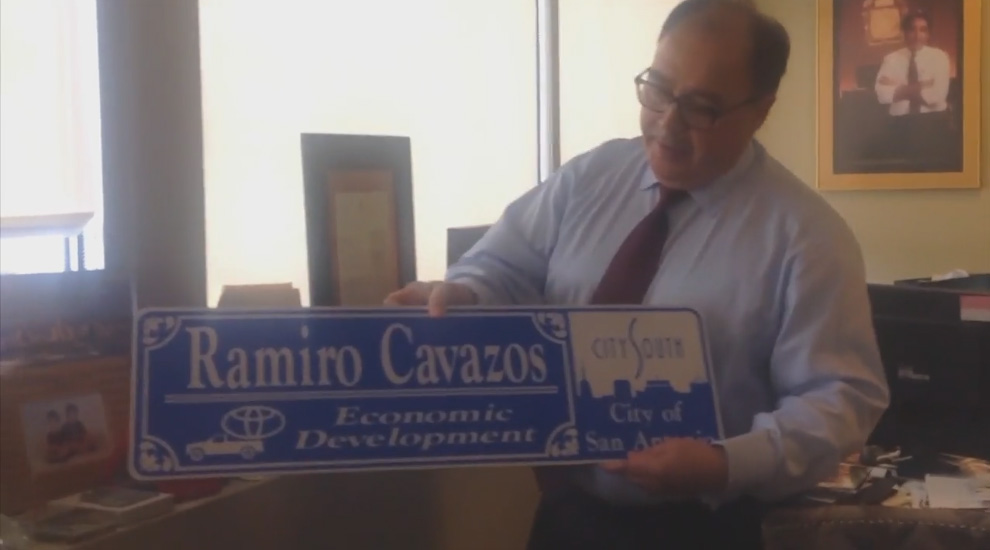The political turmoil in Washington and controversial legislation in Texas has Ramiro Cavazos busy rattling cages in D.C. and Austin these days, lobbying against policies he says are bad for business.
As CEO of the San Antonio Hispanic Chamber of Commerce, Cavazos is at the forefront of the fights against the sanctuary cities bill and transgender bathroom legislation in Texas, as well as the broader rewrite of U.S. trade rules with Mexico and Canada.
Cavazos, 55, is on his second go-around as the chamber’s CEO.
He served from 1987 to 1990 and is in his ninth year back at the same job after working as the city of San Antonio’s economic development director and operating the Levi Strauss Foundation in the interim.
He runs a staff of 17 and a $2.5 million budget that operates programs ranging from small-business advocacy and leadership development to promoting STEM education at the middle school level, preparing Latinas for public office, finding business opportunities internationally and testifying before state and federal governmental bodies on issues that affect San Antonio companies.
The San Antonio Express-News recently sat down with Cavazos. Here’s an edited transcript of the discussion:
Q: What issues is the chamber trying to influence?
A: We’ve been very busy in Austin this year, specifically fighting the bathroom bill, Senate Bill 6, the travesty that it is and what the potential damage could be to Texas business and the hospitality and tourism industry. I’ve been in Austin about 20 times, physically, testifying. We have been sending letters and we have been busy with communications with our elected officials.
The other thing we’ve been doing is looking to re-establish the North American Free Trade Agreement on the federal level, advocating with our senators and our congresspeople. We don’t need a border adjustment tax that’s been proposed by this administration in Washington. We know there’s a wall already there, and there’s enough funding going to secure the border.
Q: How exactly does the chamber try to influence policies?
A: We are meeting directly with members of the Trump administration who are responsible for opening the discussions for NAFTA. We’re doing this quietly. We also are submitting testimony and language for NAFTA.
We are working closely with our partners in San Antonio, other chambers, the city, the county, to physically write the drafts of what we would like to have included in that. A big part of that is cross-border trucking. It needs to be fully implemented. We also need a guest worker program in there. We do not have enough workers in the U.S. for a lot of these jobs.
We’ve had meetings with Sen. (John) Cornyn, with Congressman Will Hurd. We’ve been meeting with the (Texas) secretary of state, Rolando Pablos. He is in charge of economic development for the state of Texas. We’ve had meetings with Sen. Ted Cruz. Luckily he signed on with a letter with other senators to continue with NAFTA.
We think a big part of our strategy is one-on-one meetings. We met with Jennifer Korn with the White House. She is assistant to the chief of staff. She is someone who is Hispanic, from California. She’s been tapped to be the liaison with organizations such as ours to develop the strategy for trade agreements.
These happen mainly at offices. We’ve had some lunches at restaurants to break down the barriers since many of these folks are brand-new and we want them to be comfortable. So we usually meet where they want to meet.
Most of these meetings are done face to face in offices, but also in informal settings to make sure we develop relationships with one another and that they realize that as progressive-minded people on trade that we are very easy to work with and that we have good ideas and that they understand we want to grow the economy.
Q: How do you feel about the staff mix at the Hispanic Chamber?
A: We have 17 full-time positions. We are funded by small-business owners. Many (staffers) are millenials, and I have great hope for the future because we train them here. We give them the development they need.
Oftentimes, when they move on, they go to work for one of our members. My challenge as CEO is always to reload and fill positions that are vacant.
Q: Is the chamber trying to find a permanent home, perhaps its own building?
A: We pay enough rent at Pearl that we could own our own building. We love being here at Pearl. We might be in the market to build our own building or buy a building in the future. I hope that would not take us away from our core mission. If we find the right opportunity or if our members see something, we’ll take a look at it. We have two more years left on our lease here at Pearl.
Our neighbors at the Nature Conservancy have been great. They are our landlords. We sublease from them the space they had leased originally 10 years ago. We’re going to have some conversations soon with the board, do our five-year strategic plan on what we want to do to be ready for the next two years because we definitely need to get ahead of the curve.
Q: Have you ever experienced failure of some kind in your career, and how did you recover from it?
A: Back in 1993, I ran for City Council. I threw my hat in the ring for City Council District 7. I was 31 years old, and I jumped in so late that I really didn’t give myself a chance. Nowadays, to run for office, you need to start early. I wasn’t from San Antonio. I grew up in the (Rio Grande) Valley. I had been here about eight years. I made it to a runoff and lost to a businessperson named Bob Ross.
I wasn’t prepared to lose it. I had never really lost at anything or failed at anything. It broke my heart that I had failed. For about a year or two, I was healing. I thought I had done something wrong or that I was a bigger failure than I thought. But in fact it made me stronger to realize that as my first failure I could recover from it. I realized that you learn from your failures.
I thought I had let my friends down and let the community down, but it opened greater opportunities for me because being an elected official is not necessarily part of my destiny. It allowed me to do so many other things in the political realm without being a politician. That was my first failure, and I was able to overcome it mainly by leaning on friends.
Original Post:



